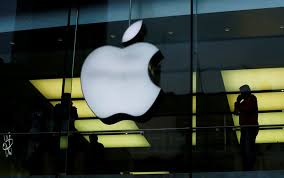Apple’s late iPhone launch temporarily wiped $100 billion off its stock value

The late launch of new 5G phones caused Apple Inc’s AAPL.O customers to put off buying new devices, leading the company on Thursday to report the steepest quarterly drop in iPhone sales in two years.
Apple fell over 5% at one point in after-hours trade, wiping $100 billion from its stock market value.
Since 2013, Apple has delivered new iPhones each September like clockwork. But pandemic-induced delays pushed the announcement back a month, with some devices still yet to ship.
Even as booming sales of Macs and AirPods boosted overall revenue and profit above what analysts had expected, iPhone sales dropped 20.7% to $26.4 billion. (Graphic: tmsnrt.rs/3ecmgCG)
Investors anticipated lower sales from the Cupertino, California company’s bestselling product, but the hold-back was worse than expected, especially in China, where more consumers have access to 5G than in the United States or Europe.
Apple has mostly beaten sales expectations this year and released a slew of new products and services that its customers have embraced while largely homebound during the pandemic.
Apple said revenue and profits for the fiscal fourth quarter ended on Sept. 26 was $64.7 billion and 73 cents per share, compared with analyst estimates of $63.7 billion and 70 cents per share, according to IBES data from Refinitiv.
But the flagship iPhone 12’s announcement was delayed until Oct. 13, several weeks later than usual, meaning no opening-weekend iPhone sales are included in the fourth-quarter results.
In an interview with Reuters, Apple Chief Executive Tim Cook said that he was “optimistic” about the iPhone 12 cycle based on the first five days of shipping data.
“5G is a once-in-a-decade kind of opportunity. And we could not be more excited to hit the market exactly when we did,” Cook said. “At least in the U.S., the carriers are being very aggressive.”
The iPhone 12 release timing drove down sales in Greater China by 28.5% to $7.95 billion. Cook said he expects the new 5G devices to help iPhone sales recover in China.
“What we’re seeing in the early going in the first five days gives us a lot of confidence that China will return to growth in our fiscal Q1,” Cook told Reuters.
Apple did not provide a revenue growth forecast, but Chief Financial Officer Luca Maestri said revenue from services and non-iPhone products would grow by double-digit percentages in the fiscal first quarter, in line with analyst expectations. He said iPhone revenue would also grow, implying the rate would be in the single digits. Analysts expect iPhone revenue to rise 6.45% to $59.56 billion in the first quarter, according to Refinitiv data.
Logan Purk, an analyst with Edward Jones, said that “while iPhone sales will grow this cycle, it will be disappointing compared to elevated expectations, as we do not believe the 5G presents a compelling reason for a wave of upgrades.”
Apple has offset volatile iPhone sales in recent years with steady growth in its services segment, which includes streaming music and television. Services revenue rose 16.3% to $14.5 billion, compared with analyst estimates of $14 billion. Cook told Reuters that Apple One, a bundle of Apple’s paid services, will launch on Friday.
Cook told Reuters that Apple has 585 million paying subscribers across its platforms, up from 550 million the previous quarter and closer to the goal of 600 million subscribers that the company set out for the end of calendar 2020.
Apple’s shares have soared in the past two years as it has diversified its revenue streams to lessen its dependence on the iPhone. The share tumble on Thursday raises the question of whether Apple is still more dependent on iPhone sales than some investors had hoped.
“Apple needs to be able to keep the upgrade cycle going or the share price will wobble because there’s no real room for forgiveness in the current valuation,” said Sophie Lund-Yates, an equity analyst at Hargreaves Lansdown.
Apple said revenue from its accessories segment was up 20.8% to $7.9 billion, compared with analyst estimates of a 13.5% rise to $7.4 billion, according to Refinitiv data. Mac and iPad sales rose to $9.0 billion and $6.8 billion, compared with estimates of $7.92 billion and $6.12 billion, according to Refinitiv data.
